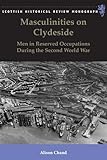Masculinities on Clydeside : Men in Reserved Occupations During the Second World War / Alison Chand.
Material type: TextSeries: Scottish Historical Review Monographs : SHRMPublisher: Edinburgh : Edinburgh University Press, [2022]Copyright date: ©2016Description: 1 online resource (216 p.)Content type:
TextSeries: Scottish Historical Review Monographs : SHRMPublisher: Edinburgh : Edinburgh University Press, [2022]Copyright date: ©2016Description: 1 online resource (216 p.)Content type: - 9781474409360
- 9781474409377
- Civilians in war -- Scotland -- Glasgow Region -- History -- 20th century
- Masculinity -- Scotland -- Glasgow Region -- History -- 20th century
- Men -- Employment -- Scotland -- Glasgow Region -- History -- 20th century
- Men -- Scotland -- Glasgow Region -- Interviews
- Men -- Scotland -- Glasgow Region -- Social conditions -- 20th century
- Oral history -- Scotland -- Glasgow Region
- Sex role in the work environment -- Scotland -- Glasgow Region -- History -- 20th century
- World War, 1939-1945 -- Social aspects -- Scotland -- Glasgow Region
- Scottish Studies
- HISTORY / Europe / Western
- 940.53/1610811094144
- D760.8.G55 C47 2016
- D760.8.G55 C47 2016
- online - DeGruyter
- Issued also in print.
| Item type | Current library | Call number | URL | Status | Notes | Barcode | |
|---|---|---|---|---|---|---|---|
 eBook
eBook
|
Biblioteca "Angelicum" Pont. Univ. S.Tommaso d'Aquino Nuvola online | online - DeGruyter (Browse shelf(Opens below)) | Online access | Not for loan (Accesso limitato) | Accesso per gli utenti autorizzati / Access for authorized users | (dgr)9781474409377 |
Frontmatter -- Contents -- Illustrations -- Acknowledgements -- CHAPTER ONE. The Schedule of Reserved Occupations, Oral History and Other Methodologies -- CHAPTER TWO. Conflicting Masculinities? Men in Reserved Occupations in Wartime Glasgow and Clydeside and their Masculine Subjectivities -- CHAPTER THREE. Belonging to Glasgow and Clydeside: Retrieving Regional Subjectivities in Wartime -- CHAPTER FOUR. The Wider Subjectivities of Men in Reserved Occupations in Wartime Glasgow and Clydeside -- CHAPTER FIVE. Re-negotiated Social Relationships: Women in Reserved Occupations in Glasgow and Clydeside -- CHAPTER SIX. Conclusions -- Bibliography -- Index
restricted access online access with authorization star
http://purl.org/coar/access_right/c_16ec
Explores the lived experiences of civilian men on Clydeside during the Second World WarMasculinities on Clydeside explores the experiences of civilian men on Clydeside during the war, using oral history interviews as a means to explore subjectivity and arguing for continuous personal agency through major historical changes. While men in reserved occupations are understood as extensively influenced by 'imagined' discourses, often resulting in feelings of guilt and emasculation, their subjectivities were nonetheless ultimately rooted in their 'lived' and immediate local vicinities, and the people and places of their everyday lives. This ultimate relevance of lived existence and the everyday also meant that while wartime relations between men and women were clearly shaped by a range of gender discourses and continually renegotiated, gender boundaries were never fixed or truly separate.The analysis looks at wider subjectivities, encompassing national and political identities, class consciousness, religious subjectivities and social activities, as well as examining women's experiences of working in reserved occupations in wartime and their interactions with civilian men.
Issued also in print.
Mode of access: Internet via World Wide Web.
In English.
Description based on online resource; title from PDF title page (publisher's Web site, viewed 02. Mrz 2022)


